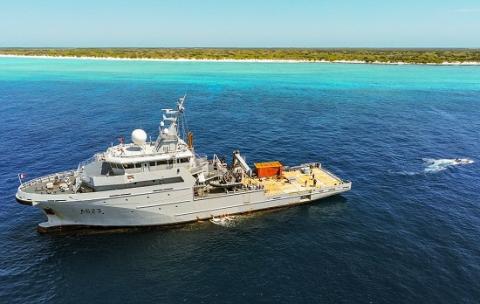
Mission Bougainville: "Interactions with sailors promise to be a source of enrichment"
Caroline, 23 yrs. old, has a degree in Marine Sciences from Sorbonne University. Passionate about marine research and attracted by the idea of combining science and military navigation, she reveals her motivations and expectations for this unique experience aboard a French Navy ship.
Caroline will be stationed in Nouméa with Corentin.
Can you tell us a little about your background?
Caroline: I've just finished my second year of my Master's in Marine Sciences at Sorbonne University. Before that, I obtained a degree in Marine Sciences at the University of Brest, then at the University of Quebec in Rimouski, where I spent my third year on exchange.
What motivated you to apply for the Bougainville Mission?
C.: I discovered the Bougainville Misson at an information meeting during the first year of my Master's. The idea of participating in research on the marine microbiome, while working on the reliability of large-scale frugal sensors, immediately appealed to me.
The unique opportunity to combine my scientific skills with an immersion in a military environment piqued my curiosity!
The mission is being carried out in collaboration with the French Navy. What do you expect from this unique experience of working on board Navy ships?
C.: Working on board a French Navy ship is going to be an incredible experience for developing my adaptability in a new environment like the Pacific Ocean. It will also allow me to see first-hand how oceanographic instruments are deployed in an operational setting, on a ship of opportunity.
I'm also looking forward to improving my communication and scientific mediation skills in this collaborative context. The interactions with the sailors promise to be a source of mutual enrichment.
How are you preparing to take on scientific responsibilities in full autonomy?
C.: Thanks to the teaching I received during my Master's degree and the specific training courses for the Bougainville Mission, I've acquired solid expertise in plankton, onboard oceanography, marine data analysis and the workings of the Navy. I'm convinced that these skills will enable me to manage my scientific responsibilities with complete autonomy in this military environment.
What challenges do you anticipate during this mission, and how do you plan to overcome them?
C.: I expect to face some challenges, including unforeseen events at sea and complications related to bioinformatics processes. However, I believe that the skills I have developed during my university career, combined with the support of the Bougainville Mission's scientific committee, will enable me to overcome these obstacles.
I'm also counting on the experience I'll gain throughout the mission to help me adapt effectively.
How do you think this mission will enrich your career and your personal development?
C.: This mission will enrich my career by enabling me to contribute to advances in the marine microbiome, in particular through the use of sustainable measurement tools.
I also hope to raise public awareness of planktonic ecosystems, which are still little-known.
On a personal level, spending a year at sea, far from everything, will considerably broaden my human and professional horizons. It will also strengthen my autonomy and my ability to adapt to new environments.
What skills do you hope to acquire or develop during this mission?
C.: I hope to develop my adaptability and autonomy, while deepening my scientific skills. I'd also like to improve my skills in popularizing and transmitting scientific knowledge, so that I can effectively raise awareness among different audiences.
Have you already thought about what you might do after Bougainville?
C.: After the Bougainville Mission, I'd like to continue studying planktonic ecosystems, either by starting a thesis or by taking up an engineering post in this field.





